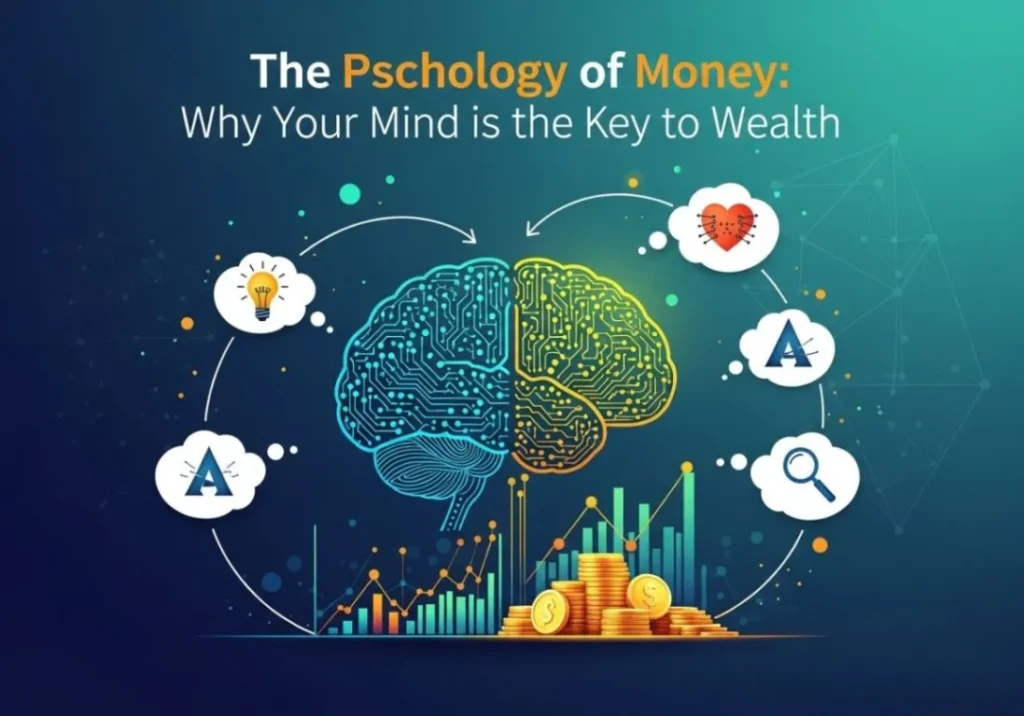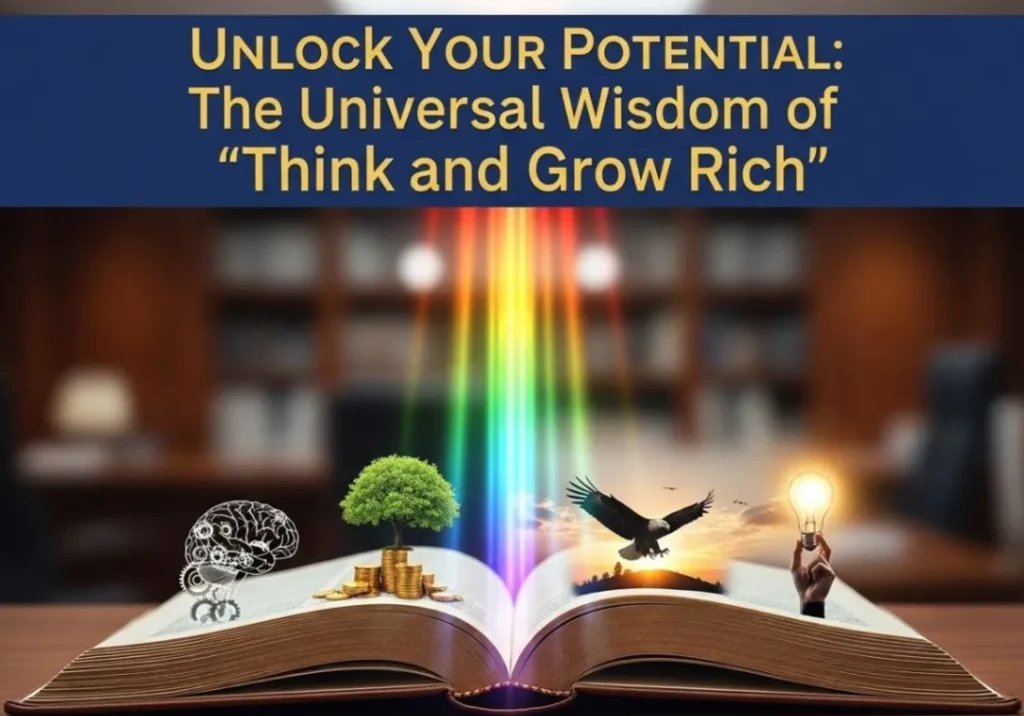The Psychology of Money: Why Your Mind is the Key to Wealth

Introduction: The Game You’re Destined to Lose?
Let’s be honest. Think about the last time you thought about money. Was it a feeling of calm, confident control? Or was it a jolt of anxiety when you checked your bank account? A flash of envy seeing a friend’s vacation on Instagram?
For decades, we’ve been told that finance is a math problem. It’s about spreadsheets, charts, and complex formulas. But what if that’s completely wrong?
What if getting wealthy and, more importantly, staying wealthy has very little to do with how smart you are and everything to do with how you behave?
This is the groundbreaking idea at the heart of Morgan Housel’s masterpiece, “The Psychology of Money: Timeless Lessons on Wealth, Greed, and Happiness.” This isn’t your typical, stuffy finance book. It’s a collection of short, powerful stories that reveal one profound truth: Your financial success is driven by psychology, not intelligence.
This deep dive is your ultimate guide to the life-changing wisdom within this book. We’re going to break down its most powerful lessons and apply them to our chaotic modern world. So grab a cup of coffee, get comfortable, and let’s unlock the secrets to a healthier, happier relationship with money.
The Big Idea: Why This Book Changes Everything
Imagine two people: a financial genius who builds complex models, and a patient janitor who simply saves and invests a small amount every month for decades. In a real-life story Housel shares, the janitor, Ronald Read, quietly amassed an $8 million fortune, while history is filled with geniuses who have gone broke.
This is the essence of the book:
Financial outcomes are driven by soft skills like patience, humility, and discipline, not by raw intelligence.
Knowing what to do tells you nothing about what happens in your head when you try to do it. Money is the same. Your behavior is the most powerful tool you have. And that’s what we’re going to explore.
10 Timeless Lessons from “The Psychology of Money”

Lesson 1: No One’s Crazy
The Core Idea: Your personal experience with money shapes about 80% of how you think about it. No one is crazy—we’ve all just had wildly different journeys that lead us to make different financial decisions.
The Modern-Day Angle (The Social Media Bubble): Your TikTok or Instagram feed is a personalized reality bubble. One person sees crypto scams and thinks it’s gambling; another sees a 19-year-old millionaire and feels they need to get in. Neither is “crazy”; they’re reacting logically to their information diet. The danger is assuming your limited experience is universal truth.
Actionable Takeaway: Practice Empathy
Before you judge someone’s financial decision, ask yourself: “What might they have experienced that makes this feel like the right move for them?” This humility is the first step to financial wisdom.
Lesson 2: Luck and Risk are Two Sides of the Same Coin
The Core Idea: Luck and risk are siblings; both are the reality that outcomes aren’t 100% in your control. We attribute our own successes to skill and failures to bad luck, but we judge others the opposite way.
The Modern-Day Angle (The “Hustle Culture” Myth): We worship founders but rarely talk about their lucky breaks. This creates a dangerous mindset: if you’re not a millionaire, you’re just not working hard enough. It ignores the powerful role of risk.
Actionable Takeaway: Focus on Patterns, Not People
Focus less on individuals (like Elon Musk) and more on broad patterns (like long-term, diversified investing). Don’t try to copy a one-in-a-million lucky shot. Practice humility in success and forgiveness in failure.
Lesson 3: Never Enough (The Man in the Car Paradox)
The Core Idea: Social comparison is a killer. When you see someone in a Ferrari, you don’t admire them; you think, “If I had that car, people would admire me.” It’s a hamster wheel that’s impossible to win.
The Modern-Day Angle (The Instagram Trap): This is the defining social struggle of our time. We are constantly bombarded with highlight reels, which systematically moves our own goalposts for happiness. The feeling of “enough” becomes impossible.
Actionable Takeaway: Stop the Goalposts from Moving
The single most powerful financial skill is defining what “enough” means to you. Write it down. Your wealth journey should be measured against your own goals, not someone else’s Instagram feed.
Lesson 4: Confounding Compounding
The Core Idea: You don’t need huge returns to get rich. You need pretty good returns that you can stick with for a very long time. Warren Buffett’s secret isn’t just his skill; it’s that he has been investing since he was a teenager. His secret is time.
The Modern-Day Angle (The “Get Rich Quick” Delusion): Compounding is the enemy of the modern mindset. We want everything now. But trying to get rich quick is the fastest way to get poor. The “boring” consistent investor almost always wins.
Actionable Takeaway: Start Now and Be Patient
Start now, even if it’s just $50 a month. Automate your investments. Then, be incredibly patient. The power isn’t in the amount; it’s in the consistency and the length of time you let it grow.
Lesson 5: Getting Wealthy vs. Staying Wealthy
The Core Idea: These are two completely different skills. Getting wealthy requires optimism and risk. Staying wealthy requires humility, fear, and survival. You need to stick around long enough for compounding to work.
The Modern-Day Angle (The Crypto Boom and Bust): Many got wealthy on paper during the bull run. But those who didn’t understand “staying wealthy”—who didn’t diversify or have a safety net—were wiped out when the market turned.
Actionable Takeaway: Have a Survival Mindset
Build a survival mindset. This means having an emergency fund, using little debt, and being reasonably diversified. Don’t put all your eggs in one basket.
Lesson 6: Tails, You Win
The Core Idea: In investing, a tiny number of events account for the majority of the results. Venture capital funds might have one investment like Facebook return more than their 499 other investments combined. Most of what you try will be average, and that’s okay.
The Modern-Day Angle (Fear of Missing Out – FOMO): This explains why index funds work. An S&P 500 fund guarantees you own the few big winners (like Apple, Amazon) that drive most of the returns. You buy the whole haystack to ensure you get the few valuable needles.
Actionable Takeaway: Diversify
You don’t know which of your investments will be the “tail” that delivers all the results. By spreading your bets through diversification (like with an index fund), you increase your odds of owning the big winners.
Lesson 7: Freedom
The Core Idea: The highest form of wealth isn’t a fancy car. It’s the ability to wake up and say, “I can do whatever I want today.” Money’s greatest value is its ability to give you control over your time.
The Modern-Day Angle (The FIRE Movement): The rise of the “Financial Independence, Retire Early” movement isn’t about hating work; it’s about craving autonomy. People are using money as a tool to buy back their time, so work becomes a choice, not a necessity.
Actionable Takeaway: Frame Goals Around Freedom
When making financial goals, don’t just think about objects. Think about what “freedom number” would allow you to take a more fulfilling job or control your schedule. Frame your savings goals around buying back your time.
Lesson 8: Wealth is What You Don’t See
The Core Idea: We judge wealth by what we see (cars, houses), but that isn’t wealth—it’s spending. Real wealth is the money you haven’t spent. It’s the stocks and bonds quietly compounding in the background. Wealth is hidden.
The Modern-Day Angle (The “Flex” Culture): Social media is a machine built to make us forget this. We see influencers draped in Gucci and assume they are wealthy. We don’t see the quiet millionaire next door with a 10-year-old Toyota.
Actionable Takeaway: Be Rich, Don’t Just Look Rich
Resist the urge to “show off.” The next time you’re tempted by a big purchase to signal status, remind yourself that true wealth is the financial security and freedom that no one else can see.
Lesson 9: You’ll Change
The Core Idea: People are terrible at predicting their future selves. Committing to a rigid, extreme, decades-long financial plan is foolish because you are making that plan for a stranger: your future self.
The Modern-Day Angle (The Career Pivot): Many people change careers. If they had shackled themselves to an extreme financial plan based on their 20-year-old self’s goals, they might have missed the opportunity to pivot to a more fulfilling life.
Actionable Takeaway: Avoid Extreme Financial Plans
Build a plan that has balance. Save a reasonable amount, but also leave room to spend money on experiences that help you grow and discover what you truly want. The goal is a strong financial base that gives your future self the most possible options.
Lesson 10: Room for Error
The Core Idea: The most important part of any plan is planning for the plan not to go according to plan. A “margin of safety” is a buffer against the unknowns of life.
The Modern-Day Angle (Inflation and Uncertainty): The last few years have been a masterclass in this. No one’s 2019 plan included a global pandemic and record inflation. People who had a margin of safety (an emergency fund, low debt) weathered the storm.
Actionable Takeaway: Build Buffers Everywhere
Have a bigger emergency fund than you think you need. Take on less debt than the bank says you can afford. This isn’t being pessimistic; it’s being realistic and unbreakable. Room for error lets you survive the bad times.
Putting It All Together: The “Psychology of Money” Mindset
How do we live this out? It boils down to a new mindset built on three pillars:
- Humility: Recognize you don’t know everything and acknowledge the roles of luck and risk.
- Patience: Embrace the slow, “boring” path of consistent saving and investing. Let compounding do the heavy lifting.
- Independence: Redefine your goal. You are using money as a tool to buy control over your time. Freedom is the ultimate prize.
This mindset is your shield against the noise of modern finance. It’s the filter for every financial decision you make.
Final Thoughts: Your First Step on a New Path
“The Psychology of Money” isn’t a book with hot stock tips. Its gift is far more valuable: a new pair of glasses through which to see your financial life. It teaches us that managing money isn’t a math competition; it’s a human endeavor. The secret to winning isn’t to become a robot, but to become a more self-aware human.
The journey to financial peace of mind doesn’t start with a complicated spreadsheet. It starts with a simple conversation and a single, small step. Save a little more this month, not because a chart told you to, but because you want to buy yourself a little more freedom. And most of all, be kind to yourself. You’re playing a long game. And with the right mindset, it’s a game you can absolutely win.
Let’s Discuss!
What was your biggest takeaway from these lessons? Share your thoughts in the comments below! We’d love to hear how the psychology of money has played out in your own life.





Your point of view caught my eye and was very interesting. Thanks. I have a question for you.